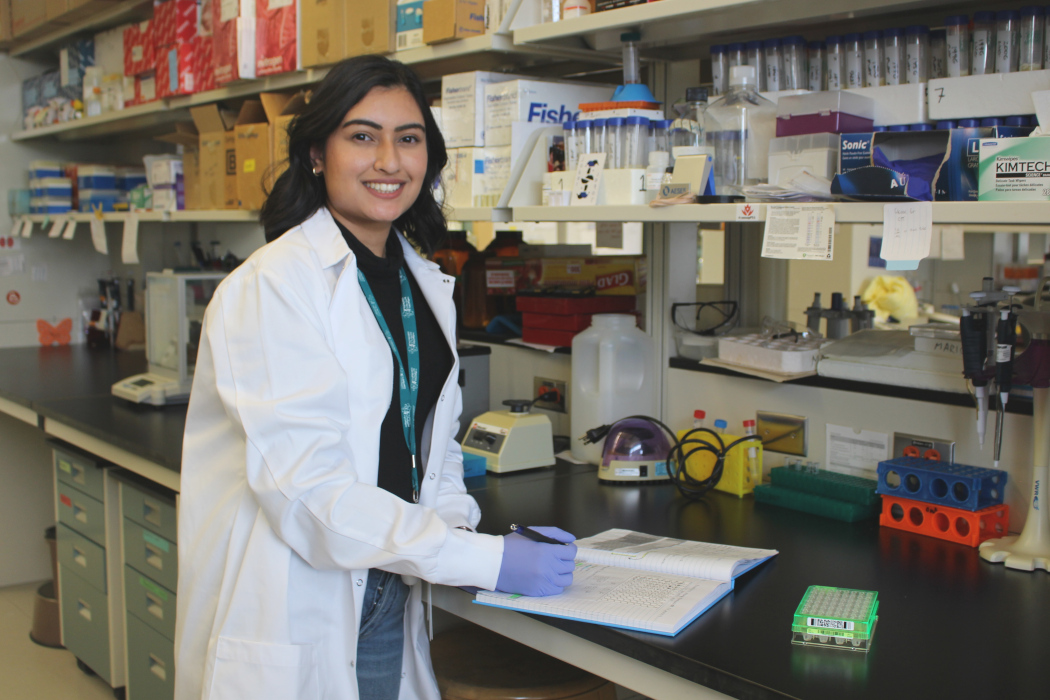
Rady grad student profile: Khushali Trivedi aims to be role model
Khushali Trivedi is focused on understanding if a particular protein plays a role in the development of gestational diabetes, one of the most common types of complications that occurs during pregnancy.
Trivedi, a first-year master’s student in pharmacology and therapeutics at the Max Rady College of Medicine, said that previous research shows that pregnant individuals with gestational diabetes tend to have a lower expression of the molecule sirtuin-3 (SIRT3), which is involved in regulating energy metabolism while reducing the production of molecules that harm cells and tissues.
Trivedi is looking into whether lower levels of SIRT3 lead to the development of gestational diabetes.
As part of the project, SIRT3 has been knocked out of the liver of an animal model so it doesn’t express the protein. Trivedi is now looking at the effects of this and comparing it with the control animal model.
Trivedi said her research will help better understand the factors that lead to gestational diabetes, and it will contribute to future studies looking at treatments aimed at improving the health of mothers and their children.
UM Today sat down with Trivedi to learn about what motivates her and her experience as a master’s student at UM.
You recently received $12,000 in funding from Research Manitoba for a project titled Role of SIRT3 deficiency in the development of gestational diabetes. What are your thoughts on receiving this funding?
I’m beyond grateful for the funding from Research Manitoba. I’m very thankful for my current supervisor, Dr. Vern Dolinsky, and previous supervisors Dr. Jason Treberg and Dr. Liam O’Neil. It wouldn’t be possible without the mentorship, guidance and support I’ve received over the years and that’s shaped me into the scientist that I am right now. Every single day I’m learning.
What motivates you to do the work you do?
Going through my undergraduate degree I didn’t see a lot of people of colour – especially women of colour – in faculty positions. I see how important it is for women and girls to have a role model to look up to. So, I aspire to be an inspiration for young women and girls who want to go into the sciences.
Why did you choose UM for your master’s?
I did my bachelor of science at the University of Manitoba and I had a very positive experience, not only with the Children’s Hospital Research Institute of Manitoba (CHRIM), but with the faculty and the university. Altogether, that led me to pursue graduate studies here. When I was looking for a supervisor and I came across Dr. Dolinsky, who studies gestational diabetes as well as mitochondrial function. CHRIM has a dedicated group that studies diabetes called the Diabetes Research Envisioned & Accomplished in Manitoba (DREAM). My interest in child health research and diabetes attracted me to UM.
What has been most rewarding during your time at UM?
I see myself becoming a better scientist every single day. I’ve not only seen academic growth, but I’ve seen a lot of personal growth and development in myself and that’s really been the most rewarding thing about academia altogether.
What do you love about the work you do?
Everything. Everything I do really drives me, especially combining my research background in metabolism with medical research focused on diabetes… and the thought that I could one day potentially make a long-lasting impact on mothers and their children.
What are your future plans?
I plan to transfer into the PhD program within the next year. I want to be a principal investigator at some point. I want to be an independent researcher and have my own lab to study mitochondrial function in terms of metabolic diseases.
This Q&A is part of a series on UM Today this summer featuring Rady Faculty of Health Sciences graduate students. You can find more grad student profiles here: #Radygradstudents.






